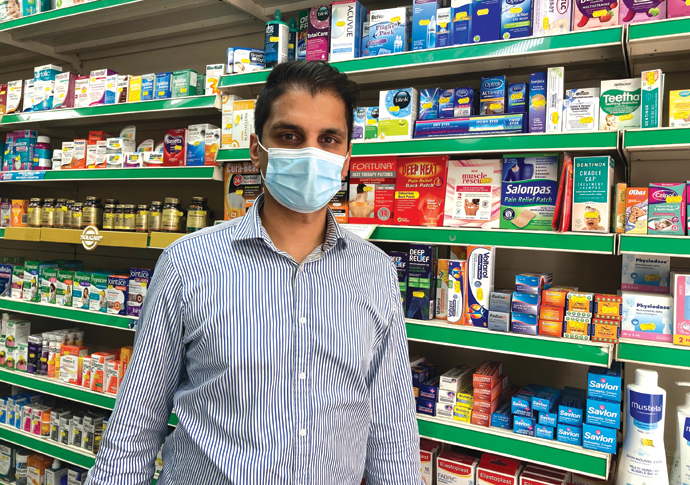People-friendly streets ‘putting patients at risk’
Pharmacist forced to reduce home deliveries as new road layouts mean journeys take too long
Friday, 9th April 2021 — By Helen Chapman

Dharmesh Patel: ‘I didn’t expect it to be as bad as it has been’
A PHARMACIST in Highbury says he worries his patients are at risk from the Low Traffic Neighbourhoods (LTNs) due to the amount of time it takes to deliver medicines.
Dharmesh Patel from C and H Pharmacy in Blackstock Road said they have reduced the number of daily deliveries and patients who have been shielding from Covid-19 are instead coming into the pharmacy.
The pharmacy makes deliveries in the Drayton Park area and say when they can walk, they do. But a lot of their medications are temperature controlled, such as insulin, and must be delivered within a short time frame.
Deliveries that used to take 10 minutes now take up to 40 minutes, it claims.
Mr Patel said: “It has affected us since January. Our patients who we deliver to are elderly and vulnerable. A lot of them have been shielding but had to come into the pharmacy to pick up their prescriptions.”
Reduced vehicle access in Highbury West allows cars through in Blackstock Road, Highbury Grove and Holloway Road via Drayton Park or Hornsey Road.
Mr Patel has asked the council for Automatic Number Plate Recognition (ANPR) to allow businesses like his and residents to have access to residential streets.
He said: “We have been forced to reduce the number of daily deliveries we make. It has affected our deliveries to those who are shielding. I didn’t expect it to be as bad as it has been.”
The pharmacy also has safety concerns for his staff delivering controlled drugs, such as opioid medicines, by foot.
Mr Patel said his staff always deliver these drugs by car to avoid thefts due to the high number of substance abusers known to the area.
Highbury East Green Councillor Caroline Russell said: “Clearly the council has a lot of work to do with local businesses to ensure they can carry out their work effectively. This is something I hope the council has learned from the roll out of trials as there are several examples where businesses need support that the council can and should provide.”
Keith Townsend, Islington Council’s corporate director for environment and regeneration, said: “We know how important Islington’s streets and neighbourhoods are for local people, but in recent years we have seen satellite navigation systems directing traffic through residential areas, causing more traffic, pollution, and road danger.
“People-friendly streets are designed to address this situation, and to help the borough respond effectively to the continued fall in public transport capacity during the pandemic.
“By reducing the dominance of motor vehicles, we can make Islington a fairer borough where everyone – including the approximately 70 per cent of households that do not own a car – can walk, cycle and use buggies and wheelchairs safely and easily.
“The monitoring data from Islington’s first people-friendly streets neighbourhood trial in St Peter’s has shown the positive impact that the scheme is having in creating a healthier, safer, greener area for local people.
“We hope and expect that our other people-friendly streets neighbourhoods will bring similar benefits.”